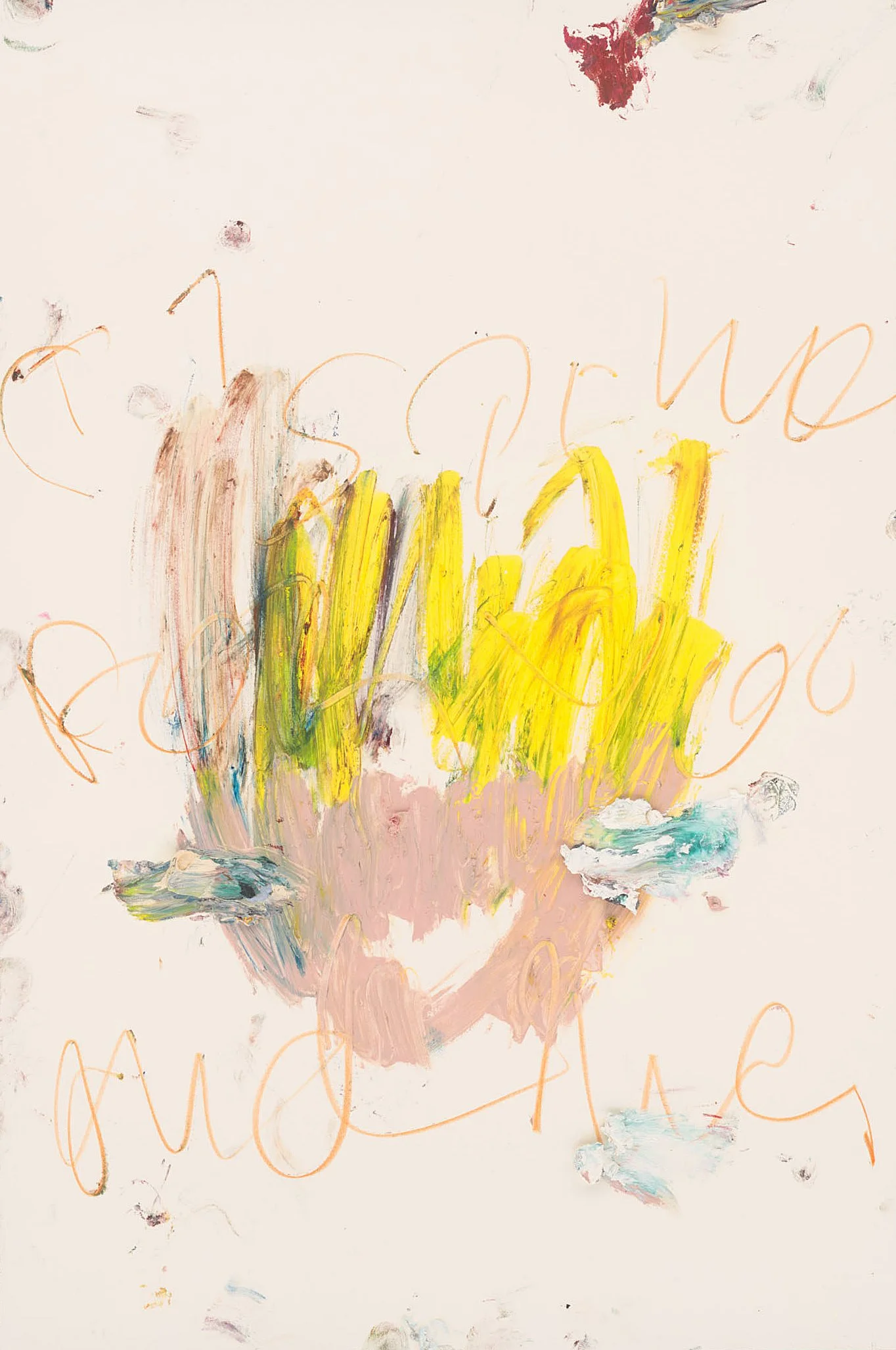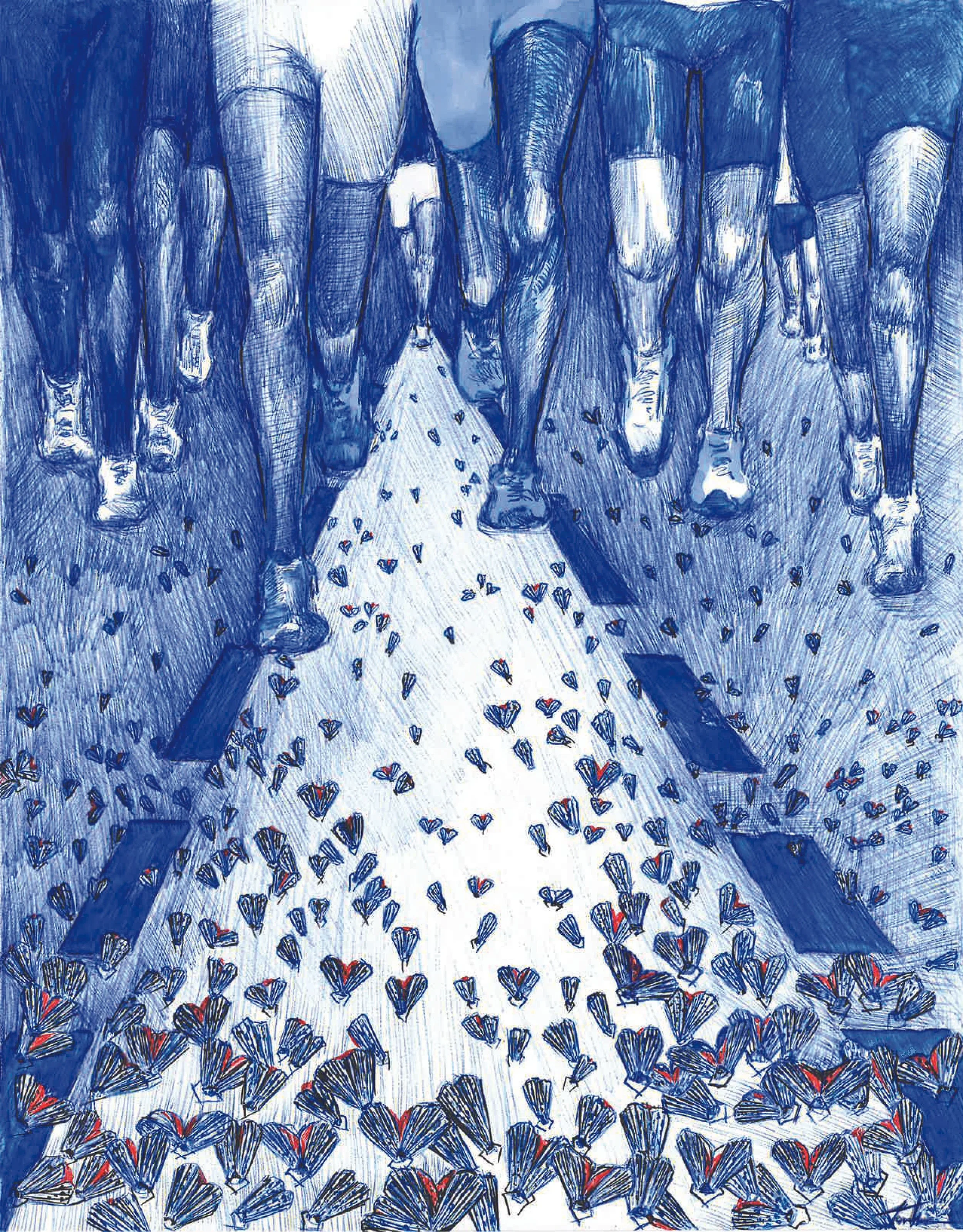10 Questions with Ariadni Vitastali
Ariadni Vitastali, born in 1970, is a Hellenic visual artist currently based in northern Greece. She holds a D.N.A.P. (Diplome National des Arts Plastiques) from the School of Fine Arts at St. Èttiene in France in 1994 and a D.N.S.A.P. (Diplôme National Supérieur des Arts Plastiques) from the school of Fine Arts of Paris, in 1998. She has exhibited internationally in multiple group shows and has shown her work in solo exhibitions in New York, France, and Greece. She is currently working on her latest series of works, which is derived from female characters in ancient Greek mythology but expressed in her own fresh, brutal, and feminine way. This series will be presented in her upcoming solo show in Thessaloniki, Greece.
Ariadni Vitastali - Portrait
ARTIST STATEMENT
Parerntheses and Myths represent the latest series of works by the artist who finds an equilibrium between abstraction and representation. The artist balances and contrasts at the same time between the blank, the smooth, and the ‘super-charged’ spaces on paper. Through the aggressiveness and tension in her handling of oil sticks, she discusses the fine lines between beauty and ugliness. For Ariadni, movement is the element that ties together space and time. Her research derives from art historical ideas and ancient Greek myths but is expressed as a statement through her own experiences and realities.
Untitled, graphite, oil crayons and oil sticks on paper, 50x70 cm, 2024 © Ariadni Vitastali
INTERVIEW
First of all, introduce yourself to our readers. Who are you, and how did you start experimenting with images?
My name is Ariadni Vitastali, and I am a female Hellenic visual artist based in Greece. My journey with painting began at an early age and was integral to my life. I started painting alongside my mother, a passionate amateur, at the age of four, who introduced me to art through books displaying impressionistic paintings. It was then that I decided I was part of that great family of artists.
You have traveled and worked in different countries, participating in exhibitions internationally. What is one experience that particularly influenced and inspired your work as an artist?
While I was introduced to Western Art and classical Greek Art early on, two distinct experiences with different cultures profoundly influenced me. First, a trip to Asia with my parents at the age of 11 revealed a world where spirituality and art intertwined, offering a new vision of reality and aesthetics. Second, visiting an American Abstract Expressionism show in London left me overwhelmed by the silent Rothkos and vibrant Pollocks. Art now had a new meaning for me, combining action, movement, and the transcendence of feelings into images.
Untitled, colored pencils and oil sticks on paper, 45,5x30,5 cm, 2024 © Ariadni Vitastali
How would you define yourself as an artist today?
As an artist, my aim is to combine painterly elements of color, sketch, scribble, alphabet letters, and/or words to create an abstract space where, ideally, automatic transcription takes place—though it may not. This process aims to define a possible indication of the random and futile present moment. My thinking aligns with questioning the element of time as in physics and interrogating the role of entropy in the diversity of natural appearances and phenomena through matter. In fact, my goal is to describe the true nature of things, the continuum of order altering to chaos and vice versa.
Can you tell us about the process of creating your work? What is your artistic routine when working?
My routine varies. Most of the times, extensive research on a topic connected to autobiographical material is the first step. Once I gather sufficient information, I make copies and studies, often based on classical or modern paintings related to the theme. Over time, my work distance itself from the originals and becomes more personal, a transcription of a diary of sorts.
Sketching on different papers and of different qualities and possibly scales allows me to focus on the recollection ofmoments and feelings, capturing the dynamics of sentiments and emotions. Aggressiveness, sadness, happiness and excitement play a major role in the development of the work. The result is often abstract, a natural movement where at any given moment elements such as color, line, or text are becoming the “subject” I investigate at different states.
The process can be exhausting, and sometimes fatigue requires a pause. When the work seems finished, that is where ‘painting’ really happens: a burst of energy often leads to a final, aggressive phase of completion.
How did you evolve this way of working?
My approach developed naturally, following the need of the moment to transition from conscious doing to almost unconscious action. The theme always guides my initial efforts, a practice I honed during school when my teacher emphasized the importance of studies.
Untitled, ink, graphite and oil sticks on paper, 150x208 cm, 2024 © Ariadni Vitastali
Untitled, pencil, acrylic ink and oil crayons on paper, 45,5x61 cm, 2024 © Ariadni Vitastali
In your works, you include different elements, shapes, colors, and even texts. How do you choose them, and what messages do you want to convey?
Each element stems from my research on the general theme but takes on an abstract dimension when applied. These elements serve as painterly ingredients, creating a visual situation of time and space. Their presence emerges automatically, reflecting the nature of the work rather than a conscious choice. The primary subject becomes less important as I integrate these elements until the work is complete.
Your abstract paintings have vivid and striking colors. How do you choose your palette, and what does it represent for you?
My palette often includes warm, fleshy colors combined with fluorescent and bold hues. Early on, my palette featured more vivid colors. Sometimes, I only draw with a hint of intense color. My aim is to create tension and contrast between calm and vibrant, obscure and bright. The color of the pencil is essential, forming the foundation of my work. Fleshy colors reference human bodies, while other colors are chosen for their vibrancy, much like a musician choosing a scale to create a certain mood.
You also reference Greek mythology. How do you use it? And how is it reflected in your works?
Greek mythology is a personal preference, as I was raised visiting museums displaying Ancient Greek art with my family and listening to stories from my grandmother. Certain myths, like the abduction of Europa, offer insights into gender, sexuality, and the transition from childhood to adulthood. I revisit these myths to explore similarities and differences in our vision of these themes across history. Myths help me understand and explore these concepts, guiding the feelings and sentiments that accompany my creative process.
Untitled, oil sticks on paper, 30,5x23 cm, 2024 © Ariadni Vitastali
Untitled, oil sticks on paper, 45,5x30,5 cm, 2024 © Ariadni Vitastali
What do you think about the art community and market? And what are your strategies for engaging with the market?
The art community is a dynamic space that inspires creativity and collaboration. The art market, while challenging and trend-driven, offers opportunities for exposure and growth.
My strategies to engage with the market include staying true to my artistic vision, building strong relationships within the art community, and maintaining an active online presence. I also focus on collaborating with other artists and seeking gallery representation that aligns with my values. By balancing authenticity with strategic engagement, I aim to connect with the right audience and create a meaningful impact. At the moment, I am strongly focusing on creating this community and collaboration by employing the power of social media and digital platforms that have no geographical restrictions.
Lastly, what are you working on now, and what are your plans for the future? Anything exciting you can tell us about?
Currently, I am working on an exciting new series based on material I will not yet reveal! It’s a project I am very enthusiastic about, one that explores new dimensions in my work and further deepens on themes, pushing the boundaries of my previous endeavors. I am also preparing for my upcoming solo show at DONOPOULOS IFA Gallery in Thessaloniki, Greece, starting in September 2024. This exhibition will feature my latest works, that I am eager to share them with the public.
Artist’s Talk
Al-Tiba9 Interviews is a promotional platform for artists to articulate their vision and engage them with our diverse readership through a published art dialogue. The artists are interviewed by Mohamed Benhadj, the founder & curator of Al-Tiba9, to highlight their artistic careers and introduce them to the international contemporary art scene across our vast network of museums, galleries, art professionals, art dealers, collectors, and art lovers across the globe.





















